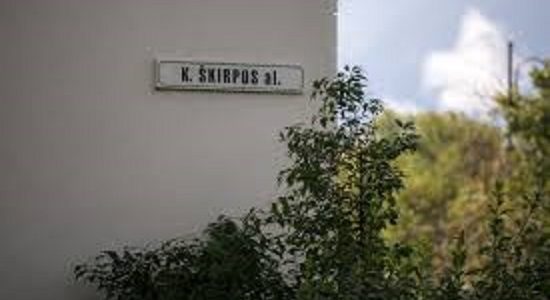The Lithuanian Jewish Community presents the opinion of the historian Dr. Norbertas Černiauskas concerning the issue of renaming a central Vilnius street now named after Lithuanian Nazi ideologue Kazys Škirpa. On July 10 the city council postponed making a decision until July 24 on renaming the street Tricolor Alley in remembrance of Škirpa’s act at the dawn of interwar Lithuanian independence, placing the Lithuanian tricolor flag atop the tower of Gediminas overlooking central Vilnius.
Dr. Norbertas Černiauskas:

The issue of the name of the alley which runs along the Vilnelė creek long ago became no longer an issue of history or a matter connected with the discovery of some additional documents. This is a matter of political culture and communal empathy now.
Both the International Commission for the Assessment of the Crimes of the Nazi and Soviet Occupational Regimes in Lithuania and the Center for the Study of the Genocide and Resistance of Residents of Lithuania along with other major researchers on the Holocaust in Lithuania have stated in their works the Lithuanian Activist Front commanded by Škirpa, despite all the patriotic, anti-Soviet and “the creation of a New Lithuania” rhetoric, promoted political (not personal) anti-Semitism which was transmitted via various channels to Soviet-occupied Lithuania as well.
It is always possible to claim that some additional historical documents are needed to really understand fully Škirpa’s actions, we can always doubt the veracity of certain sources (and actually the history of one very controversial [LAF] call to action has not been fully researched) and we can always engage in academic discussion; this is the normal academic practice which never stops concerning any historical problem. Nonetheless, it is difficult to maintain there are essential documents missing which are needed to solve the problem of the naming of this alley, that some sort of selective “trial” of an historical personage is being held, or that a true judgment of the past is somehow “distorted” through the lens of present experience. The name of a place is being considered, after all, which does offend, with reason, a portion of an historical community of the city, and not a legal assessment of the entire life of a person, nor the writing of a monograph on his entire political career.
Furthermore, the political idea of limiting the rights of a large portion of society based on ethnicity or creed was not tolerated in any form in interwar Lithuania (1918-1940), so there is no objective reason to think this could have become the norm in Lithuania in wartime. It is very hard to argue that this is some comfortable contemporary “intervention” in the past. I will repeat myself: this is no longer a matter of discussions of history, it is a matter of empathy today.
Honestly, I don’t believe Škirpa was the major Nazi ideologue in Lithuania some claim, but his anti-Semitic political activities as commander of the LAF in conjunction with his political efforts to limit or completely deny civil rights to Jewish Lithuanian citizens because of their ethnicity does not do honor to Lithuanian society nor to the Lithuanian state, neither in the 20th nor in the 21st century.


